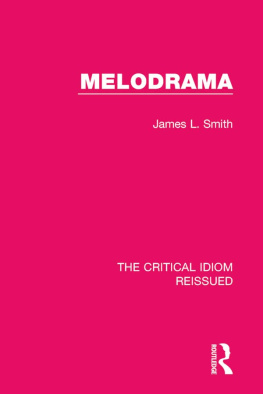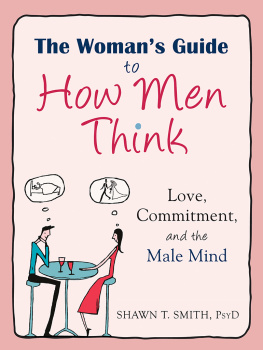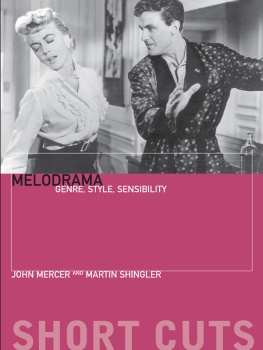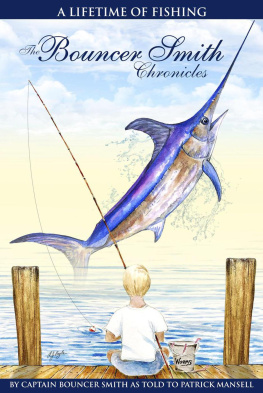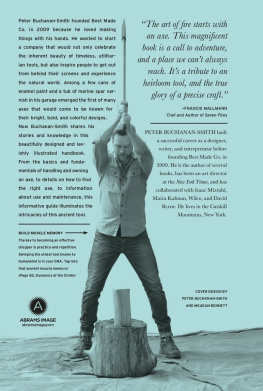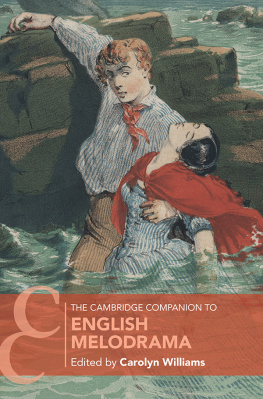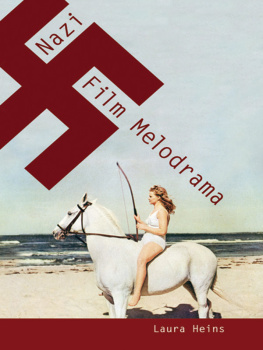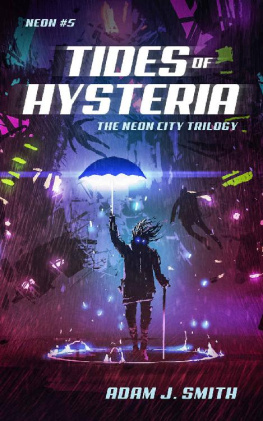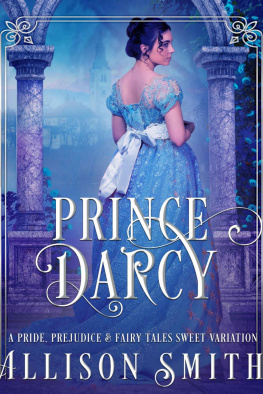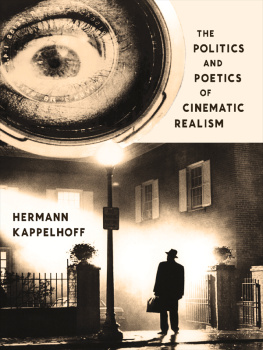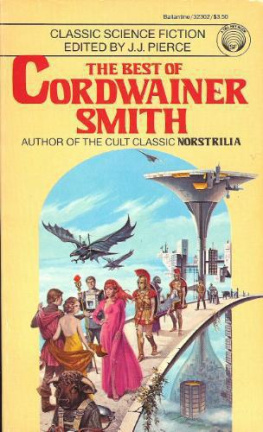Smith - Melodrama
Here you can read online Smith - Melodrama full text of the book (entire story) in english for free. Download pdf and epub, get meaning, cover and reviews about this ebook. City: London, year: 2019;2017, publisher: Routledge, genre: Home and family. Description of the work, (preface) as well as reviews are available. Best literature library LitArk.com created for fans of good reading and offers a wide selection of genres:
Romance novel
Science fiction
Adventure
Detective
Science
History
Home and family
Prose
Art
Politics
Computer
Non-fiction
Religion
Business
Children
Humor
Choose a favorite category and find really read worthwhile books. Enjoy immersion in the world of imagination, feel the emotions of the characters or learn something new for yourself, make an fascinating discovery.
- Book:Melodrama
- Author:
- Publisher:Routledge
- Genre:
- Year:2019;2017
- City:London
- Rating:5 / 5
- Favourites:Add to favourites
- Your mark:
- 100
- 1
- 2
- 3
- 4
- 5
Melodrama: summary, description and annotation
We offer to read an annotation, description, summary or preface (depends on what the author of the book "Melodrama" wrote himself). If you haven't found the necessary information about the book — write in the comments, we will try to find it.
Smith: author's other books
Who wrote Melodrama? Find out the surname, the name of the author of the book and a list of all author's works by series.
Melodrama — read online for free the complete book (whole text) full work
Below is the text of the book, divided by pages. System saving the place of the last page read, allows you to conveniently read the book "Melodrama" online for free, without having to search again every time where you left off. Put a bookmark, and you can go to the page where you finished reading at any time.
Font size:
Interval:
Bookmark:


by Routledge
2 Park Square, Milton Park, Abingdon, Oxon OX14 4RN
711 Third Avenue, New York, NY 10017
A catalogue record for this book is available from the British Library
ISBN: 978-1-315-26975-7 (Set) (ebk)
ISBN: 978-1-138-28381-7 (Volume 27) (hbk)
ISBN: 978-1-315-11541-2 (Volume 27) (ebk)
The publisher has gone to great lengths to ensure the quality of this reprint but points out that some imperfections in the original copies may be apparent.
The publisher has made every effort to trace copyright holders and would welcome correspondence from those they have been unable to trace.
by Methuen & Co Ltd
11 New Feuer Lane London EC4
1973 James L. Smith
ISBN 0 416 79340 1 Paperback
HARPER & ROW PUBLISHERS, INC.
BARNES & NOBLE IMPORT DIVISION
For my mother
The volumes composing the Critical Idiom deal with a wide variety of key terms in our critical vocabulary. The purpose of the series differs from that served by the standard glossaries of literary terms. Many terms are adequately defined for the needs of students by the brief entries in these glossaries, and such terms do not call for attention in the present series. But there are other terms which cannot be made familiar by means of compact definitions. Students need to grow accustomed to them through simple and straightforward but reasonably full discussions. The main purpose of this series is to provide such discussions.
Many critics have borrowed methods and criteria from currently influential bodies of knowledge or belief that have developed without particular reference to literature. In our own century, some of them have drawn on art-history, psychology, or sociology. Others, strong in a comprehensive faith, have looked at literature and literary criticism from a Marxist or a Christian or some other sharply defined point of view. The result has been the importation into literary criticism of terms from the vocabularies of these sciences and creeds. Discussions of such bodies of knowledge and belief in their bearing upon literature and literary criticism form a natural extension of the initial aim of the Critical Idiom.
Because of their diversity of subject-matter, the studies in the series vary considerably in structure. But all authors have tried to give as full illustrative quotation as possible, to make reference whenever appropriate to more than one literature, and to write in such a way as to guide readers towards the short bibliographies in which they have made suggestions for further reading.
John D. Jump
University of Manchester
What is melodrama? In 1913 William Gillette confessed that even when he questioned really intellectual people none of them appeared to be certain. The situation has not changed. Ask a musician, or a literary scholar, or even that convenient abstraction the man in the street. You will get three very different answers.
The first melodrama, the musician points out, was Pygmalion, a brief scne lyrique with libretto by Jean Jacques Rousseau. The plot is simplicity itself: Pygmalion chips away at his statue of Galathe, the marble comes to life, breathes a few words (mostly moi) and sinks into the arms of her astonished creator as the curtain falls. The novelty lies in Rousseaus method of linking words with music. He thought French too harsh a language to be sung and for Pygmalion devised instead a kind of musical leap-frog:
un genre de drame, dans lequel les paroles et la musique, au lieu de marcher ensemble, se font entendre successivement, et ou la phrase parlee est en quelque sorte annoncee et preparee par la phrase musicale. [a type of drama in which words and music, instead of going together, are heard alternately, and where the spoken phrase is, as it were, announced and prepared by the musical phrase.]
(Observations sur lAlceste de M. Gluck, 1774, Oeuvres compltes, Paris, 183637, III. 563)
Thus while Pygmalion broods in silence, music expresses his dejection; when he speaks, it stops; he takes up the chisel, and it starts again. The idea caught on. Pygmalion was performed at Lyons in 1770, at Weimar in 1772 and took Paris by storm in 1775. Goethe praised it, and Georg Benda paid it the compliment of imitation in his Ariadne auf Naxos (1774). So did Florian, whose Hro et Landre (1785) shows the heroine anxiously monologuing at Sestos while a storm lashes the Hellespont and Leandre is glimpsed sinking beneath the waves. Meanwhile, Benda carried the experiment further in his Medea (1775), with dialogue spoken not in between but over the music. It became necessary to distinguish such works from opera proper, and the term to hand was
Font size:
Interval:
Bookmark:
Similar books «Melodrama»
Look at similar books to Melodrama. We have selected literature similar in name and meaning in the hope of providing readers with more options to find new, interesting, not yet read works.
Discussion, reviews of the book Melodrama and just readers' own opinions. Leave your comments, write what you think about the work, its meaning or the main characters. Specify what exactly you liked and what you didn't like, and why you think so.

